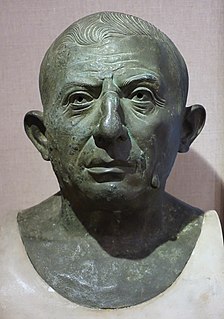Related Research Articles

The gens Mamilia was a plebeian family at ancient Rome during the period of the Republic. The gens was originally one of the most distinguished families of Tusculum, and indeed in the whole of Latium. It is first mentioned in the time of the Tarquins; and it was to a member of this family, Octavius Mamilius, that Lucius Tarquinius Superbus, the seventh and last King of Rome, betrothed his daughter. The gens obtained Roman citizenship in the 5th century BC, and some of its members must subsequently have settled at Rome, where Lucius Mamilius Vitulus became the first of the family to hold the consulship in 265 BC, the year before the First Punic War.

The gens Aurelia was a plebeian family at ancient Rome, which flourished from the third century BC to the latest period of the Empire. The first of the Aurelian gens to obtain the consulship was Gaius Aurelius Cotta in 252 BC. From then to the end of the Republic, the Aurelii supplied many distinguished statesmen, before entering a period of relative obscurity under the early emperors. In the latter part of the first century, a family of the Aurelii rose to prominence, obtaining patrician status, and eventually the throne itself. A series of emperors belonged to this family, through birth or adoption, including Marcus Aurelius and the members of the Severan dynasty.

The gens Quinctia, sometimes written Quintia, was a patrician family at ancient Rome. Throughout the history of the Republic, its members often held the highest offices of the state, and it produced some men of importance even during the imperial period. For the first forty years after the expulsion of the kings the Quinctii are not mentioned, and the first of the gens who obtained the consulship was Titus Quinctius Capitolinus Barbatus in 471 BC; but from that year their name constantly appears in the Fasti consulares.

The gens Calpurnia was a plebeian family at ancient Rome, which first appears in history during the third century BC. The first of the gens to obtain the consulship was Gaius Calpurnius Piso in 180 BC, but from this time their consulships were very frequent, and the family of the Pisones became one of the most illustrious in the Roman state. Two important pieces of Republican legislation, the lex Calpurnia of 149 BC and lex Acilia Calpurnia of 67 BC were passed by members of the gens.
The gens Lutatia, occasionally written Luctatia, was a plebeian family of ancient Rome. The first of the gens to obtain the consulship was Gaius Lutatius Catulus in 242 BC, the final year of the First Punic War. Orosius mentions their burial place, the sepulchrum Lutatiorum, which lay beyond the Tiber.
The gens Quinctilia, also written Quintilia, was a patrician family at ancient Rome, dating from the earliest period of Roman history, and continuing well into imperial times. Despite its great antiquity, the gens never attained much historical importance. The only member who obtained the consulship under the Republic was Sextus Quinctilius in 453 BC. The gens produced numerous praetors and other magistrates, but did not obtain the consulship again for over four hundred years.
The gens Otacilia, originally Octacilia, was a plebeian family at ancient Rome. The gens first rose to prominence during the First Punic War, but afterwards lapsed into obscurity. The first of the family to obtain the consulship was Manius Otacilius Crassus, in 263 BC.

The gens Antonia was a Roman family of great antiquity, with both patrician and plebeian branches. The first of the gens to achieve prominence was Titus Antonius Merenda, one of the second group of Decemviri called, in 450 BC, to help draft what became the Law of the Twelve Tables. The most prominent member of the gens was Marcus Antonius.

The gens Caecilia was a plebeian family at ancient Rome. Members of this gens are mentioned in history as early as the fifth century BC, but the first of the Caecilii who obtained the consulship was Lucius Caecilius Metellus Denter, in 284 BC. The Caecilii Metelli were one of the most powerful families of the late Republic, from the decades before the First Punic War down to the time of Augustus.

The gens Hostilia was an ancient family at Rome, which traced its origin to the time of Romulus. The most famous member of the gens was Tullus Hostilius, the third King of Rome; however, all of the Hostilii known from the time of the Republic were plebeians. Several of the Hostilii were distinguished during the Punic Wars. The first of the family to obtain the consulship was Aulus Hostilius Mancinus in 170 BC.

The gens Sestia was a minor patrician family at ancient Rome. The only member of this gens to obtain the consulship in the time of the Republic was Publius Sestius Capitolinus Vaticanus, in 452 BC.
The gens Cincia was a plebeian family at Rome. The first member of the gens to achieve prominence was Lucius Cincius Alimentus, who was elected praetor in 209 BC.

The gens Sergia was a patrician family at ancient Rome, which held the highest offices of the Roman state from the first century of the Republic until imperial times. The first of the Sergii to obtain the consulship was Lucius Sergius Fidenas in 437 BC. Despite long and distinguished service, toward the end of the Republic the reputation of this gens suffered as a result of the conspiracy of Catiline.

The gens Curtia was an ancient but minor noble family at Rome, with both patrician and plebeian branches. The only member of the gens invested with the consulship under the Republic was Gaius Curtius Philo, in 445 BC. A few Curtii held lesser magistracies during the Republic, and there were two consuls suffectus in imperial times. However, the gens is best remembered from a series of legends dating from the traditional founding of the city to the early Republic.
The gens Fufia was a plebeian family at ancient Rome. The gens does not appear to have been of great antiquity, and only appears in history toward the beginning of the first century BC.
The gens Fulcinia was a minor plebeian family at ancient Rome. The first of this name to appear in history is Gaius Fulcinius, one of the ambassadors to Fidenae in 438 BC. After this, no Fulcinius is mentioned until the time of Cicero. Several Fulcinii are known from the first century BC, although it is not clear whether or how they were related to the ambassador.

The gens Labiena was a plebeian family at Rome. Members of this gens are first mentioned during the final century of the Republic.
The gens Oppia was an ancient Roman family, known from the first century of the Republic down to imperial times. The gens may originally have been patrician, as they supplied priestesses to the College of Vestals at a very early date, but all of the Oppii known to history were plebeians. None of them obtained the consulship until imperial times.
The gens Orchia or Orcia was a minor plebeian family at Rome. Few members of this gens held Roman magistracies, of whom the most notable was probably Gaius Orchius, tribune of the plebs in 181 BC, and the author of a sumptuary law, the repeal of which was strongly opposed by Cato the Elder. Other Orchii are known from inscriptions.

The gens Procilia, sometimes written Procillia, was a minor plebeian family at ancient Rome. Members of this gens are first mentioned during the final century of the Republic, but few of them obtained any position of importance in the Roman state, and they are best known as a result of the historian Procillius, a contemporary of Cicero, whose work has been lost, but who was cited as a source by the Roman antiquarians.
References
- 1 2 3 4 Dictionary of Greek and Roman Biography and Mythology , William Smith, Editor.
- ↑ Paulus Diaconus, epitome of Festus, De Significatu Verborum (epitome of Marcus Verrius Flaccus) s. vv. Flaminius Camillus, Flaminius Lictor.
- ↑ Johann Caspar von Orelli, Onomasticon Tullianum ii. p. 254.
- ↑ Joseph Hilarius Eckhel, Doctrina Numorum Veterum v. p. 212.
- ↑ Velius Long. p. 2234.
- ↑ Flav. Caper, p. 2242.
- ↑ Charis. p. 78, ed. Putschius.
- ↑ Sextus Pompeius Festus, epitome of Marcus Verrius Flaccus, De Verborum Significatus. v. Chilo.
- ↑ Marcus Tullius Cicero, Pro Cluentio 45, 53.
- ↑ Gaius Sallustius Crispus, The Conspiracy of Catiline 28, 36.
- ↑ Marcus Tullius Cicero, Epistulae ad Atticum xii. 52, xiv. 16, 17, xv. 2.
- ↑ Joseph Hilarius Eckhel, Doctrina Numorum Veterum v. pp. 212, 213.
![]() This article incorporates text from a publication now in the public domain : Smith, William, ed. (1870). Dictionary of Greek and Roman Biography and Mythology .
This article incorporates text from a publication now in the public domain : Smith, William, ed. (1870). Dictionary of Greek and Roman Biography and Mythology .{{cite encyclopedia}}: Missing or empty |title= (help)